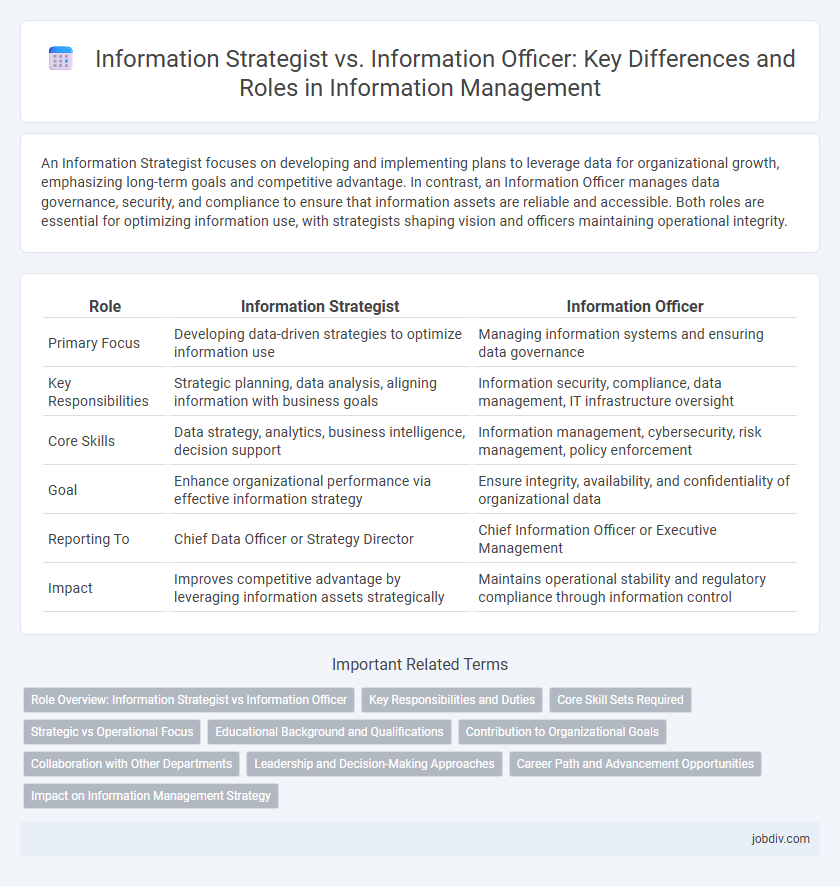An Information Strategist focuses on developing and implementing plans to leverage data for organizational growth, emphasizing long-term goals and competitive advantage. In contrast, an Information Officer manages data governance, security, and compliance to ensure that information assets are reliable and accessible. Both roles are essential for optimizing information use, with strategists shaping vision and officers maintaining operational integrity.
Table of Comparison
| Role | Information Strategist | Information Officer |
|---|---|---|
| Primary Focus | Developing data-driven strategies to optimize information use | Managing information systems and ensuring data governance |
| Key Responsibilities | Strategic planning, data analysis, aligning information with business goals | Information security, compliance, data management, IT infrastructure oversight |
| Core Skills | Data strategy, analytics, business intelligence, decision support | Information management, cybersecurity, risk management, policy enforcement |
| Goal | Enhance organizational performance via effective information strategy | Ensure integrity, availability, and confidentiality of organizational data |
| Reporting To | Chief Data Officer or Strategy Director | Chief Information Officer or Executive Management |
| Impact | Improves competitive advantage by leveraging information assets strategically | Maintains operational stability and regulatory compliance through information control |
Role Overview: Information Strategist vs Information Officer
An Information Strategist focuses on developing long-term data management plans and aligning information assets with business goals to drive competitive advantage. An Information Officer oversees daily information governance, ensuring compliance, data quality, and security across the organization. Both roles are essential but differ in scope, with strategists guiding future-oriented initiatives and officers managing operational information frameworks.
Key Responsibilities and Duties
An Information Strategist develops and implements data-driven plans to optimize information management aligning with business goals, focusing on analytics, innovation, and long-term strategy. An Information Officer oversees the governance, security, and compliance of information systems, ensuring data integrity, privacy, and regulatory adherence. Both roles require collaboration with IT and management teams, but the Strategist centers on strategy formulation while the Officer emphasizes operational control and policy enforcement.
Core Skill Sets Required
An Information Strategist requires expertise in data analysis, strategic planning, and knowledge management to align information systems with business objectives effectively. Core skills include proficiency in data governance, predictive analytics, and communication to influence decision-making processes. In contrast, an Information Officer emphasizes operational skills such as IT infrastructure management, cybersecurity, and compliance, ensuring the secure and efficient handling of organizational information assets.
Strategic vs Operational Focus
An Information Strategist primarily focuses on developing long-term plans to leverage data for competitive advantage, aligning information assets with business goals. In contrast, an Information Officer manages the operational execution of these strategies, overseeing data governance, security, and information systems to ensure efficiency and compliance. The strategist drives strategic innovation, while the officer ensures day-to-day operational integrity.
Educational Background and Qualifications
An Information Strategist typically holds advanced degrees in information management, data science, or business strategy, with certifications such as Certified Information Professional (CIP) enhancing their expertise. In contrast, an Information Officer often possesses a background in IT, computer science, or library science, coupled with credentials like Certified Information Systems Security Professional (CISSP) or ITIL certification. Both roles demand strong analytical skills, but the strategist emphasizes strategic planning and data utilization while the officer focuses on information governance and operational management.
Contribution to Organizational Goals
An Information Strategist drives organizational growth by aligning data management and analytics initiatives with long-term business objectives, enabling informed decision-making and competitive advantage. An Information Officer ensures the security, integrity, and accessibility of information systems, supporting operational efficiency and compliance. Both roles are pivotal in leveraging information assets to optimize performance and achieve strategic goals.
Collaboration with Other Departments
Information Strategists collaborate closely with marketing, sales, and IT departments to align data-driven initiatives with business objectives, ensuring cohesive strategy execution. Information Officers work alongside legal, compliance, and security teams to manage data governance and protect organizational information assets. Both roles require cross-departmental communication to optimize information flow and support decision-making processes.
Leadership and Decision-Making Approaches
Information strategists emphasize visionary leadership, crafting long-term plans that align data initiatives with organizational goals, while information officers prioritize operational decision-making to ensure data governance and compliance. Strategists drive innovation by anticipating future information needs, whereas officers focus on implementing policies that maintain data integrity and security. Both roles require strong analytical skills but differ in scope, with strategists concentrating on strategic foresight and officers managing day-to-day information processes.
Career Path and Advancement Opportunities
Information Strategists typically focus on developing and implementing data-driven strategies to optimize organizational performance, often progressing into senior roles like Chief Data Officer or Strategy Director. Information Officers concentrate on managing information governance, compliance, and IT infrastructure, advancing toward positions such as Chief Information Officer or IT Director. Both career paths offer growth opportunities in leadership, with Information Strategists leaning toward strategic innovation and Information Officers emphasizing operational management and regulatory adherence.
Impact on Information Management Strategy
An Information Strategist shapes long-term information management strategies by analyzing organizational goals and emerging data trends to optimize decision-making processes. In contrast, an Information Officer focuses on implementing and maintaining information systems, ensuring compliance, security, and efficient data governance. The strategist drives innovation and alignment with business objectives, while the officer manages operational effectiveness and risk mitigation within information management frameworks.
Information Strategist vs Information Officer Infographic

 jobdiv.com
jobdiv.com